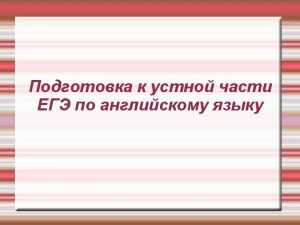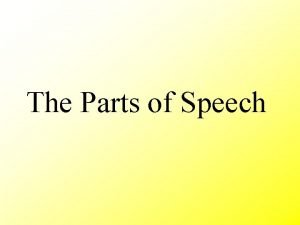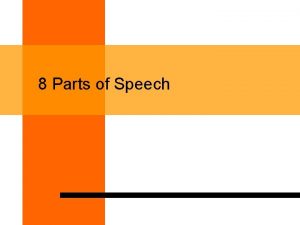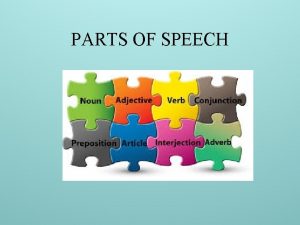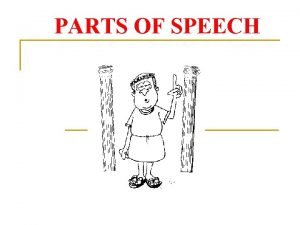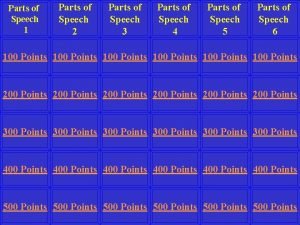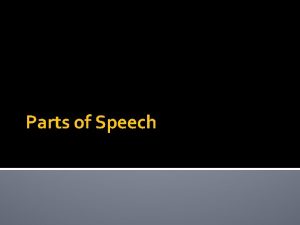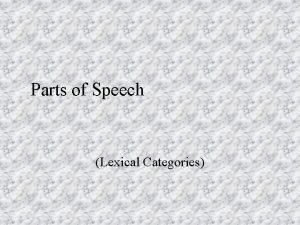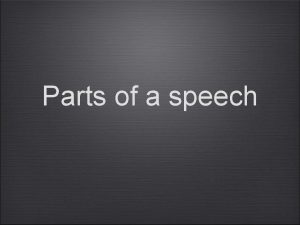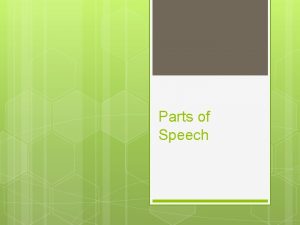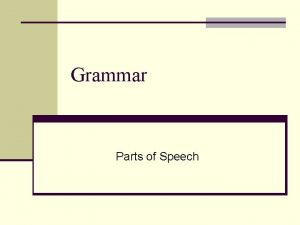Parts of Speech Preparing for your upcoming project












- Slides: 12

Parts of Speech Preparing for your upcoming project

Standard for Mastery • LITERACY: L 7. 4 • Determine or clarify the meaning of unknown and multiple-meaning words or phrases. • Use sources to determine pronunciations, parts of speech, etc

Sooooooo…how many parts of speech are there? 182874 85683

common and Proper Nouns a thing an idea a place a person

Verbs Infinitive Tell WHAT the noun is doing helping Linking Action Intransitive Transitive Click on each circle to learn more State of being

Adjective • Describes a noun

Ho ? w h W ? e er Ho w. O Wh fte n en? ?

Interjection

Preposition

Conjunction Subordinating Conjunctions ride ON A WHITE BUS Conjunctions are either coordinating or subordinate Remember: A coordinating conjunction joins two independent clauses!

Pronoun High achieving learners – click here • Personal pronouns (e. g. , he, they) • Demonstrative pronouns (e. g. , this, these) • Interrogative pronouns (e. g. , which, who) • Indefinite pronouns (e. g. , none, several) • Possessive pronouns (e. g. , his, your) • Reciprocal pronouns (e. g. , each other, one another) • Relative pronouns (e. g. , which, where) • Reflexive pronouns (e. g. , itself, himself) • Intensive pronouns (e. g. , itself, himself)

Recap Let’s play a game Noun: A noun is a person, place, thing, quality, or act. Examples: pencil, girl, supermarket, happiness Verb: Verbs are action or existence words that tell what nouns do. Examples: to fly, to run, to be, jump, lived Adjective: An adjective describes a noun. Examples: hairy, crazy, wonderful Adverb: An adverb describes a verb, adjective, or adverb. It often ends in "ly". Examples: carefully, easily, barely Interjection: An outcry or sudden utterance. Usually starts a sentence. Examples: Wow, Gosh, Amazing Preposition: A preposition describes the relationship between a noun and another noun(or verb or adverb). Examples: to, under, for, at, by, from Conjunction: A conjunction joins together words, phrases, or clauses. Examples: and, or, but, because, since, Pronoun: A pronoun replaces a noun or noun phrase that is understood from context. Examples: he, it, they
 Imagine that you are preparing a project with your friend
Imagine that you are preparing a project with your friend Chapter 1 preparing your path to success
Chapter 1 preparing your path to success Give us your hungry your tired your poor
Give us your hungry your tired your poor Kontinuitetshantering i praktiken
Kontinuitetshantering i praktiken Novell typiska drag
Novell typiska drag Tack för att ni lyssnade bild
Tack för att ni lyssnade bild Vad står k.r.å.k.a.n för
Vad står k.r.å.k.a.n för Varför kallas perioden 1918-1939 för mellankrigstiden?
Varför kallas perioden 1918-1939 för mellankrigstiden? En lathund för arbete med kontinuitetshantering
En lathund för arbete med kontinuitetshantering Särskild löneskatt för pensionskostnader
Särskild löneskatt för pensionskostnader Tidbok för yrkesförare
Tidbok för yrkesförare A gastrica
A gastrica Förklara densitet för barn
Förklara densitet för barn
